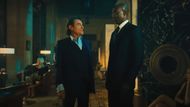John Wick started as a story of a man seeking vengeance against those who killed his dog. Of course, it wasn't just about the dog but what it represented. It symbolized the hope he was left with after his wife's tragic passing. Eventually, he returned to his criminal roots and went on a killing rampage. Soon, he crossed paths with his old pal and the Continental Hotel's owner, Winston.
Winston and John were in a seemingly tight bond. The owner supported John many times during his journey. He also let John find enough time before enacting John's "excommunicado" status, which was meant to terminate John's access to underworld resources and their privileges. However, their bond took a strange turn when Winston decided to shoot John at the end of Chapter 3 - Parabellum. Many viewers reportedly found it surprising considering their history.
Recently, the film's producer Basil Iwanyk decided to clear the air and reveal why the controversial ending makes sense in the John Wick universe. He said,
"So you gotta understand... The one thing we said in the first movie is that every person in the John Wick movies is a bad guy or villain. That there's no purity anywhere except for Helen, that everybody is cursed and stained and has done horrible things."
John Wick Producer Basil Iwanyk on why Winston shot John in Chapter 3

The third chapter of Keanu Reeves' John Wick ended on a shocking note. It showed Winston, John's close associate, shooting him and leaving him deeply wounded. According to the reports, many fans were surprised by this twist in the film's third act. They couldn't believe Winston betraying John's trust, especially considering all he had done for the man.
So, during a recent interview, Basil Iwanyk, one of the producers of this crime thriller's third installment, addressed the concern. He noted that everyone involved in this criminal world was somehow morally tainted, except John's ex-wife.
Iwanyk also elaborates as to why Winston would take this shocking step considering the High Table in their criminal underworld. He says:
"Everything's transactional right now...you start realizing there's a crack in there that he [Winston] actually looks at John as like surrogate son. And so for Winston, there's never really one reason why he makes a move. In other words, he'll make a move, and he'll leave just enough openings to be able to repackage the move."

At the end of John Wick's third chapter, Winston shoots John but the bullet does not kill the infamous Baba Yaga. Iwanyk sees it as a smart move on Winston's part, knowing how John can be of use to him in the future. The producer says:
"I truly believe when he [Winston] shoots him, and this is not a cop-out, I think there was one part of him that said, Okay, this is going to get me good with the High Table, and I'm going to be okay, and we'll live happily ever after. And then I think there's another part of him that said, Okay, I'm going to do this in a way where John could live because I may need him in the future."
He further adds:
"And because if he really wanted to kill John Wick... You don't shoot a guy once and stumble and then he falls off. You shoot him like five times. In it, you literally chop, as Keanu would always suggest when we were making these movies, he's like, I want my head chopped off. Like, it would be something barbaric."
So, the John Wick producer sees the film's end as a representation of the criminal world they inhabit, where every person tied is a bad guy in some way. He notes how Winston is always planning and thinking of his future, and how there is always an agenda behind all his actions.
Love movies? Try our Box Office Game and Movie Grid Game to test your film knowledge and have some fun!
